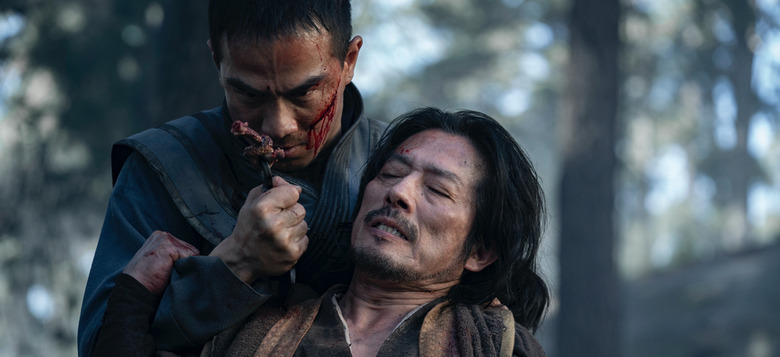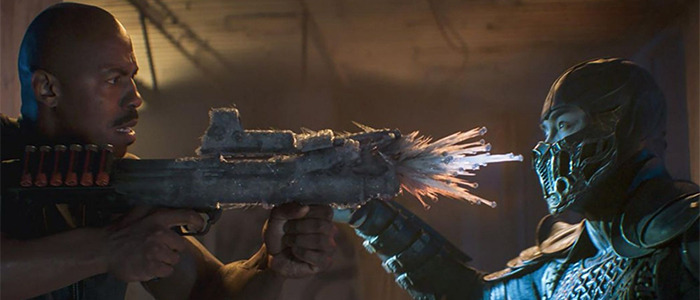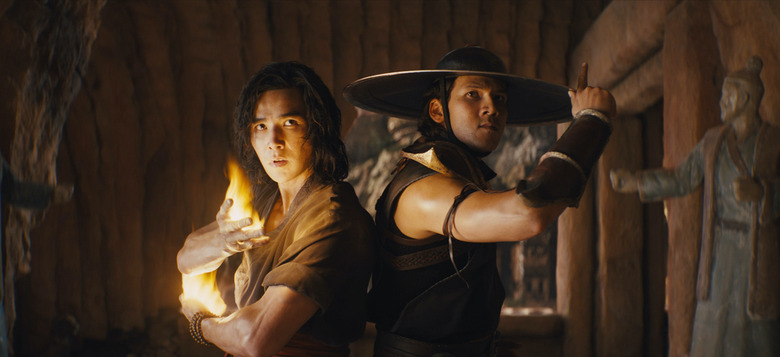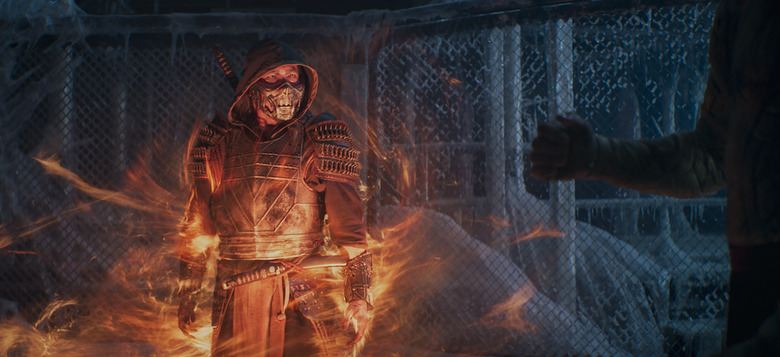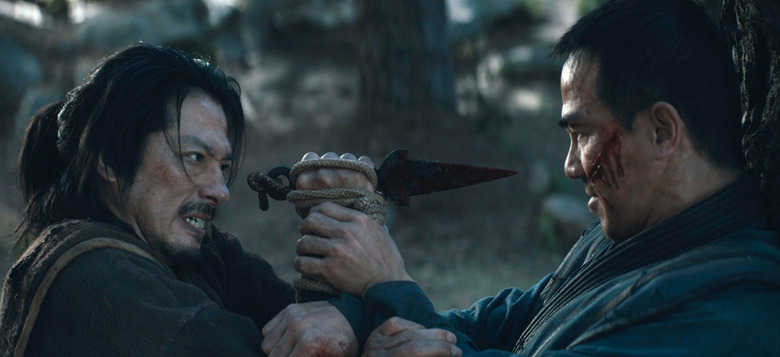We Need To Talk About The Worst Part Of The New 'Mortal Kombat' Movie
The new Mortal Kombat movie is bad.
Sure, maybe you enjoyed it. Maybe it scratched a specific itch for you. Maybe it surpassed your low standards. But let's be honest with ourselves here: it's a bad movie, a misfire that somehow manages to ignore what makes its source material such goofy, compelling fun while also failing as an actual piece of cinema.
I'm not here to write a review of Mortal Kombat. We already have one of those. I'm here to talk about the worst part of the new film, the element that ground my gears to dust and made it clear that this take on the obscenely violent and utterly ridiculous video game franchise didn't understand the appeal of those games. This is an aspect that even Paul W.S. Anderson's 1995 film – itself an imperfect, rubbery pile of nonsense – managed to get right. In other words: no excuses.
The rest of this post contains spoilers for Mortal Kombat.
Are There Any Mortal Kombats in Your Mortal Kombat Movie?
Before we get to the worst part of Mortal Kombat, it's vital that we do our due diligence and run down the things that aren't the worst part of Mortal Kombat. You know, for scientific purposes.
Let's start with a big one: the fact that there is no Mortal Kombat in Mortal Kombat. Yes, this is a movie about combatants from several dimensions preparing for a fighting tournament that will decide the fate of Earth. Much of the film is dedicated to training for this tournament, which apparently begins in several weeks. The entire story builds toward it, with characters spouting off exposition amidst training montages. And then...there's no tournament. Sure, there's fighting, but this is a Mortal Kombat movie where the villains are working to prevent the tournament of the title. And that would be fine (tons of Mortal Kombat games don't focus on the tournament!) if the entire screenplay wasn't literally built around establishing the rules and importance of that tournament before ending with the promise of a sequel...where we will actually see the tournament.
The result is a movie that feels like the world's most expensive prequel comic, the four-issue miniseries with bad art released in the months before release that you don't have to read, but it's there in case you want it. This is 110 minutes of set-up, of moving characters into a place where they will hopefully become interesting so they can hopefully be interesting in the next movie. It's insidious, really. Two hours of "just wait 'til you see the next one!" The final frame of Mortal Kombat teases the arrival of Johnny Cage, a movie star martial artist and popular character from the games. It's an ending entirely built around setting things up rather than delivering. At least Marvel movies know how to offer some meat with their tease.
Character, Assassination
But that's not the worst part of Mortal Kombat. Also not the worst part: the characters, who are, well, also pretty terrible. Jessica McNamee is hopelessly lost as Sonya Blade, giving the worst performance seen in a major studio release in...years? Lewis Tan doesn't fare too much better, mainly because his character (created for the film and not originating in the games) is about as interesting as a pile of lumber. Other characters register more. Liu Kang, Raiden, Sub-Zero, Kung Lao and the rest of the crew are more entertaining by default because they're visually striking and built out of video game avatars designed to do interesting stuff. It doesn't make them any more complex (they're paper-thin and exist solely to spout exposition and move the plot from one point to another), but they at least bear the mere suggestion of fun.
Honestly, the big problem here is that the most charismatic and fun person onscreen for the bulk of the film is Josh Lawson's Kano, a racist psychopath whose entire comic relief persona is built around him being an unbearable monster. Weird how we gravitate toward the bad guy when the bad guy is the only one presented with any personality and panache?
You Understood That Reference
But that's also not the worst part of Mortal Kombat. And while it's frustrating, the film's hackneyed, checklist-style approach to paying tribute to its source material is not the worst part of the film. Here is a movie more interested in winking at people who know the video games than crafting a satisfying movie. It's a film made with one goal: to make the "fans" happy by giving them things to point at, Leonardo DiCaprio in Once Upon a Time in Hollywood-style, allowing them to shout "I understand that reference!" Granted, there's nothing wrong with Easter eggs or references in films, but there's a certain grace required in working them into a story. Here, they stand out like a sore thumb.
Is it funny for a character to decimate another in a fight and utter "Fatality"? Yeah. Is it expected for Shang Tsung to bellow "Finish him!" Of course. But these moments don't occur naturally. The film pauses over them, like a sitcom waiting for its laugh track, to make sure that you saw it. Because the filmmakers are fans like you and you as a fan must enjoy this because clearly it was made for you and only you and aren't you special! There's a fine line between being self-aware and pandering, and Mortal Kombat lurches over that line early and often. There's no honesty to the film's goofiness – it's a corporate checklist of "Thing To Include In A Mortal Kombat Movie," presented without soul or grace.
And don't even start with "What did you expect from a Mortal Kombat movie?" Because damn it, great goofball cheese can showcase grace and wit and personality. Setting low bars and then being pleased when something clears it is a bad look for culture. The world of Mortal Kombat, its silly blend of action and fantasy, deserves more care. It's a goddamn institution and should be treated as such.
Speed Round
But that's also not the worst part of Mortal Kombat. I'm getting there. Let's speed this up.
The worst part of Mortal Kombat is not the under-utilization of Scorpion and Sub-Zero, two enigmatic and terrifying characters who own the screen whenever the camera is on them and make you wonder why the entire film wasn't built around Joe Taslim and Hiroyuki Sanada, two performers whose mere physical presences dominate the frame, commanding your attention more than a dozen lines from exposition master Liu Kang. That the film features Sanada for all of 10 minutes is a crime. The film peaks early with a flashback sequence starring Sanada and Taslim that promises a much better movie. Those opening moments suggest that director Simon McQuoid does have an eye for action and character, and that somehow the rest of the movie just got away from him in a profound way.
The worst part of Mortal Kombat is not that the whole thing feels cheap and small, with much of the action taking place in a sandpit where characters train for the tournament that never happens. Of course, the climax does change this up by taking place in an iced-over MMA fighting cage, which is exactly where you want your fantastical martial arts adventure film to end. What scope!
And hell, the worst part of Mortal Kombat isn't even the totally botched theme song, which hits the same literal beats at the iconic 1995 track without the same energy. It would've been better to ignore the song entirely than to roll something so lifeless over the end credits.
How to Make Every Mortal Kombat Character Boring
Wait? Why are we here? Oh, yes. The worst part of Mortal Kombat. Okay. We're here now. Sorry.
The worst part of Mortal Kombat is the whole "arcana" thing. You know, the magical powers that can be unlocked by anyone who bears that Mortal Kombat logo birthmark that lets them fight in the tournament (the tournament that never happens in the movie). This whole angle is hackneyed and silly in the wrong ways, misunderstanding the entire appeal of these characters.
Do you know what's fun about Mortal Kombat? The wide range of its fighters and their purpose for being at a fighting tournament that will decide the fate of the entire world. Everyone is there for a different reason: as a righteous defender of Earthrealm, as a conceited celebrity seeking glory, as a wronged warrior desiring vengeance, etc. And they all come from a wide variety of backgrounds: noble warrior monk, undead ninja, military commando, cyborg mercenary with a laser eye, etc. When you fire up a Mortal Kombat game and are instructed to select your fighter, it's a buffet of goodness – there's something for all tastes, a variety of wild characters who have no business being in the same room together aside from their own personal desire to participate in Mortal Kombat.
But the new film takes this feast of variety and reduces its scope. Now, everyone is here to fight in the tournament (that once again, isn't even in the movie) because of a magical birthmark. Destiny. Chosen ones. Harry Potter stuff. You know, only the most tired trope of 21st century fiction, the elements upon which a hundred YA novels are built. This ragtag collection of brawlers and killers have become heroes chosen by fate and it's hard to think up a more boring way to reinterpret one of the most anarchic and intentionally ridiculous casts in all of fiction.
And because making this ragtag team of independent spirits into chosen ones without their own unique motivations and goals clearly wasn't enough, the script decides that their abilities should come from the same place, too. The film reveals that every fighter with the Mortal Kombat birthmark has access to an "arcana," a magical power of some kind. Kano has a laser eye. Liu Kang can summon fire. Cole...grows armor skin? Or something? Suddenly, all of these diverse characters with unique backgrounds cease to matter, because they're all magical now. Yes, even the guy with robotic arms is magical, and his magical power is to...grow better robot arms.
It's stunning how dull this is, how a collection of unique fighters whose entire appeal is that they come from different corners of the world with their own unique skill sets have been turned into magical destiny superheroes whose abilities come from the same plot point. The base pleasure of Mortal Kombat, of most martial arts movies, is to watch different fighters match their skills. In this case, you really want to watch the ice wizard fight the soldier with robot arms because it's a collision of abilities that have no business being in the same movie, let alone the same fighting ring. That's the appeal. That's the fun. And it's been smoothed out and homogenized to mean absolutely nothing.
Yes, Mortal Kombat is a major media franchise owned by a massive corporation. But it has always been funky and funny and gloriously off-the-rails, the result of deranged video game developers steering their wild mythology into brazen corners over the course of several decades, cackling the entire time. The 1995 movie, while not necessarily good, at least leaned hard into this goofball universe and understood that there is an undeniable appeal to watching a cocky movie star punch a four-armed monster in the nuts. When the inevitable sequel gets made, it won't mean as much: that movie star will have magic powers that come from the same place as everyone else in the movie, and what fun is that?

